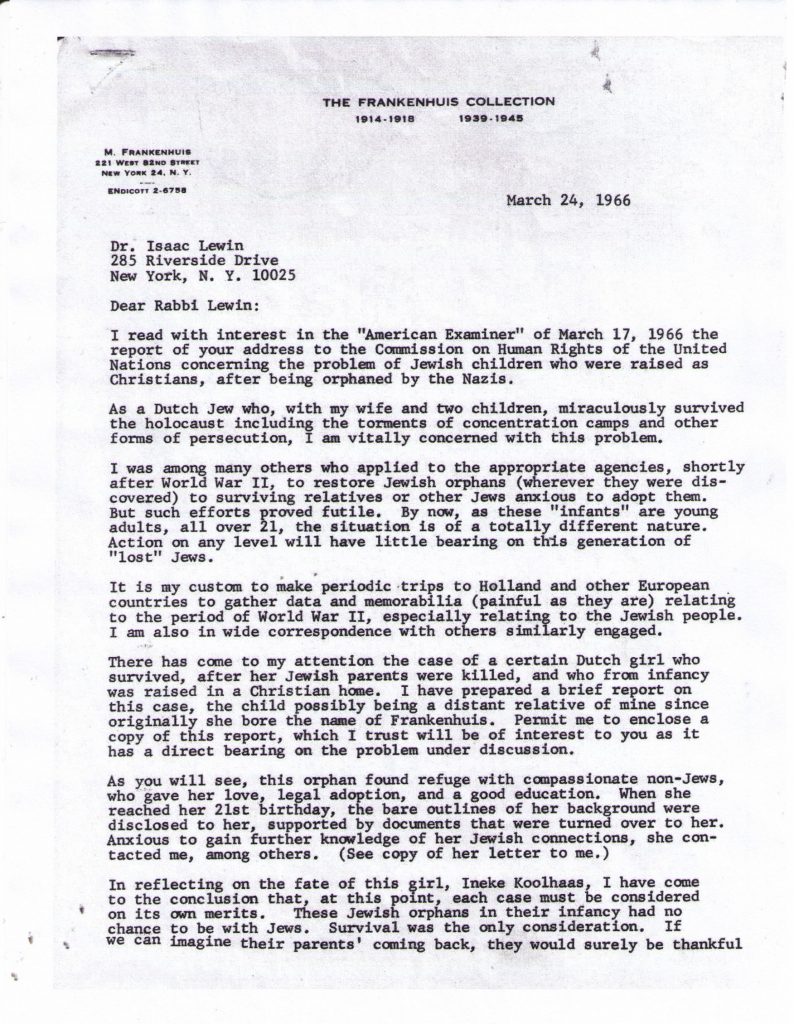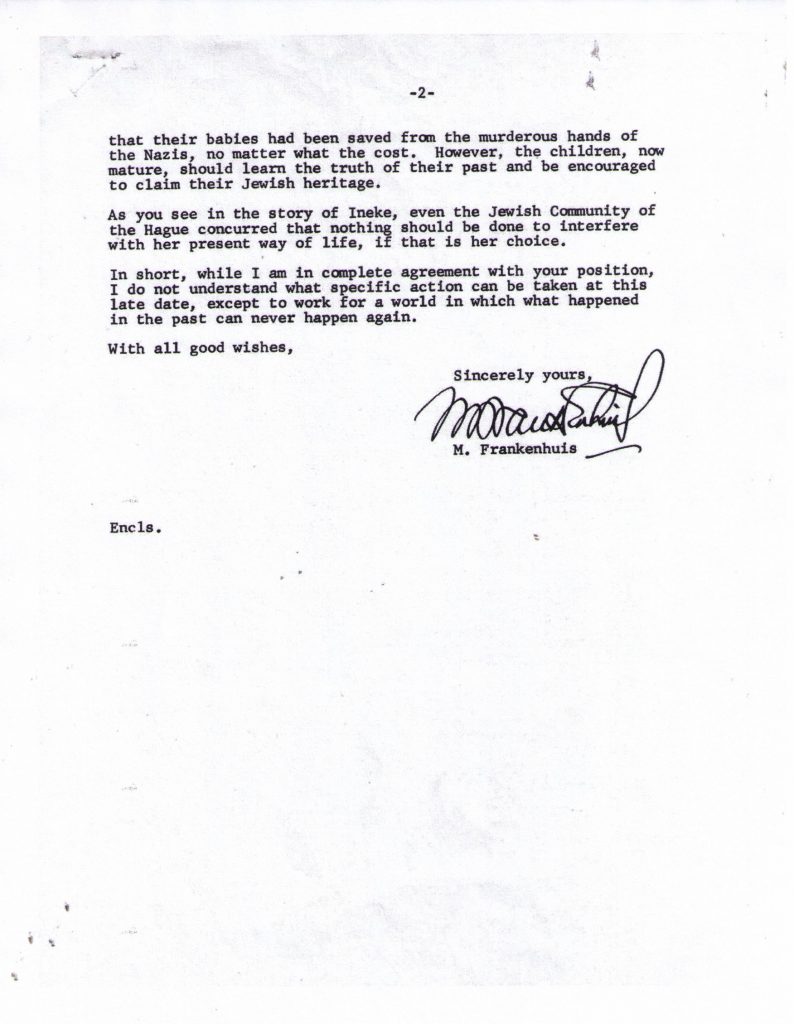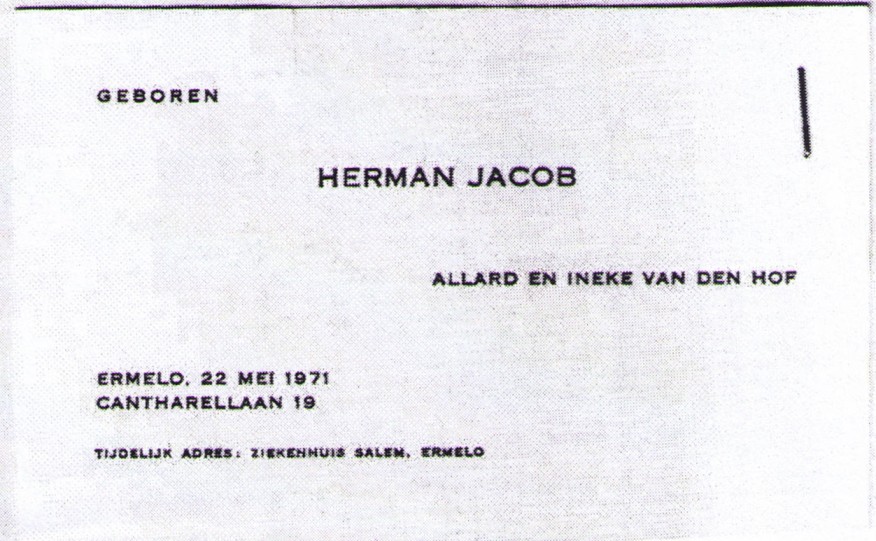Orphan raised by Christians seeks history
Recovering Lost Jews


THE FRANKENHUIS COLLECTION
1914-1918 1939-1945
M. FRANKENHUIS
221 WEST 82ND STREET
NEW YORK 24. N. Y
ENDICOTT 2-6758
March 24, 1966
285 Riverside Drive
New York, N. Y. 10025
Dear Rabbi Lewin:
I read with interest in the “American Examiner of March 17, 1966 the report of your address to the Commission on Human Rights of the United Nations concerning the problem of Jewish children who were raised as Christians, after being orphaned by the Nazis.
As a Dutch Jew who, with my wife and two children, miraculously survived the holocaust including the torments of concentration camps and other forms of persecution, I am vitally concerned with this problem.
I was among many others who applied to the appropriate agencies, shortly after World War II, to restore Jewish orphans (wherever they were discovered) to surviving relatives or other Jews anxious to adopt them. But such efforts proved futile. By now, as these “infants” are young adults, all over 21, the situation is of a totally different nature. Action on any level will have little bearing on this generation of “lost” Jews.
It is my custom to make periodic trips to Holland and other European countries to gather data and memorabilia (painful as they are) relating to the period of World War II, especially relating to the Jewish people. I am also in wide correspondence with others similarly engaged.
There has come to my attention the case of a certain Dutch girl who survived, after her Jewish parents were killed, and who from infancy was raised in a Christian home. I have prepared a brief report on this case, the child possibly being a distant relative of mine since originally she bore the name of Frankenhuis. Permit me to enclose a copy of this report, which I trust will be of interest to you as it has a direct bearing on the problem under discussion.
As you will see, this orphan found refuge with compassionate non-Jews, who gave her love, legal adoption, and a good education. When she reached her 21st birthday, the bare outlines of her background were disclosed to her, supported by documents that were turned over to her. Anxious to gain further knowledge of her Jewish connections, she contacted me, among others. (See copy of her letter to me.)
In reflecting on the fate of this girl, Ineke Koolhaas, I have come to the conclusion that, at this point, each case must be considered on its own merits. These Jewish orphans in their infancy had no chance to be with Jews. Survival was the only consideration. If we can imagine their parents’ coming back, they would surely be thankful that their babies had been saved from the murderous hands of the Nazis, no matter what the cost. However, the children, now mature, should learn the truth of their past and be encouraged to claim their Jewish heritage.
As you see in the story of Ineke, even the Jewish Community of the Hague concurred that nothing should be done to interfere with her present way of life, if that is her choice.
In short, while I am in complete agreement with your position, I do not understand what specific action can be taken at this late date, except to work for a world in which what happened in the past can never happen again.
With all good wishes,
Sincerely yours
M. Frankenhuis
Encls.
Translation of Letter written by Ineke Koolhaas, The Hague, Holland on September 16, 1964, sent by air-mail to my address in New York and forwarded to me to Holland, where I was spending my vacation.
Dear Mr. Frankenhuis:
Through the family on my mother’s side, I have been advised to contact you. I would like to give you my life’s history and ask you if you may know something about my father’s family. But let me start with the beginning.
Geertje Nieweg, born May 29, 1898, in Oude Pekela, was married to Arie Salamon Nathan Frenk. From this marriage three children were born, one of which was my mother, viz. Mathilde Rosette Frenk.
Selma Heiman, born December 3, 1885, in Werne a/d Lippe, was married to Saloman Frankenhuis. They had four children, the oldest of which was my father, viz. Abraham Herman Frankenhuis, born April 21, 1912 in Enschede. Of this marriage Ineke (Tineke) Frankenhuis was born February 1, 1943 in Eethen (North Brabant). That child am I. Both my father and mother were killed on July 16, 1943 in Sobibor [a notorious camp in Poland].
I was born whilst my parents were in hiding. Soon after I was born they went to Enschede and they were captured. However, I remained at the address where they were in hiding. From there I was taken to the vicarage of Vicar Koolhaas, who has adopted me as his child and changed my name to Koolhaas. My name is now Ineke Koolhaas. This change of name took place in 1952.
This year, I became of age and I obtained various documents which made me anxious to investigate and thus eventually secure information about my family. Through these papers I found out everything about my mother’s family, and that there were still some relatives alive with whom I have already made contact. Through them I gained further knowledge, but in all the papers there was not a single clue as to my father’s family. However, I would like to know as much as possible about his family.
Now may I ask if you would eventually supply me with further information or help me to make these contacts.
Sincerely yours,
(Signed) Ineke Koolhaas
P.S. (Written in English)
I hope you can read this letter. I wrote this letter in Dutch because it was too difficult for me to translate all these things in English. When you don’t understand this letter, please send it back to me and I shall go to a translator.
So I hope you can help me.
Yours sincerely,
(Signed) Ineke Koolhaas
(Address)
The Hague
Holland
https://www.joodsmonument.nl/nl/page/137805/abraham-herman-frankenhuis
Personal visit to Ineke Koolhaas in Holland Sept 1964
In September, 1964, while on a visit to Holland, the enclosed letter (original written in Dutch) was forwarded to me. The writer was a girl of 21, Ineke Koolhaas, who had been born in Eethen, Holland, and abandoned there when her parents were apprehended by the German police, with the assistance of a Dutch “Quisling.” As the letter indicates, the infant was saved by the heroic parson, Dominé Overduin, and placed in the home of another minister, Vicar Koolhaas, at the Hague, where she received loving care.
Rather than engage in correspondence, I decided to call on Ineke Koolhaas, at Tomatenstr., the Hague.
On September 29, I appeared at the door, rang the bell, and a young woman opened it. I inquired for Ineke, who was called downstairs to greet me.
“Are you Ineke?” I asked. “I would like to speak to you.'”
She escorted me upstairs to the living quarters.
“Your name is Koolhaas?” I asked.
“Yes, my name now is Koolhaas.”
“And before?”
Yes”, she answered.
“Koolhaas… always Koolhaas?” I asked.
She was puzzled by my questions, but was very gentle and patient.
“May I ask who you are and what you want?”
“I will tell you later.”
We continued chatting, and at last came to the subject I wanted to discuss with her.
“You had another name — long ago?”
“Yes.” After some hesitation, she said, “Frankenhuis.”
“Frankenhuis? But that is a Jewish name. Koolhaas is not.”
Again she asked, “Please, sir, what is it you wish. You seem to
know a great deal about me.”
“I will tell you, and when I do, you will exclaim, ‘Oh, oh:’”
When I saw her extreme curiosity, I did not let her wait any longer and I told her of the letter she had written to me, Maurice Frankenhuis.
And she did exclaim, “Oh, Oh!”
Then she freely told me her life’s story, and her future plans.It was Overduin, the vicar in Enschede, who has placed her at the home of the Vicar Koolhaas. He was one of the heroes in
the Netherlands and had saved many Jews during the German occupation.
Ineke showed me photographs of her parents. Naturally she had no recollection of them, as they had been taken away soon after her birth and were killed when she was only five months old.
She was interested to know more of her paternal grandparents, whom she had mentioned in her letter to me.
I believe I knew her father and grandfather, but am not too sure of this. Ineke promised to write me when she obtained further information from her foster-parents and then I would be more certain that the persons I knew were her grandfather and her father. There was an Abraham Frankenhuis and his son was Nemi. I remember Nemi’s getting married to a very good looking girl, who I believe was German.
Ineke told me she is now Protestant. She knows very little about Judaism. “G.d is everywhere,” she said. She would like to remain a Christian, and she goes to church regularly.
She has a sweetheart, 24 years old, a teacher, who lives in the eastern part of Holland. They hope to be married, and in the meantime she attends school, studying to be a teacher too. She will graduate in 1967, and in the meantime she spends her evenings studying hard to prepare for examinations.
It was a pleasant, friendly interview. Ineke was delighted when I mentioned that she was a sweet girl and very attractive and charming. And she was pleased when I asked if she would care some time to go out with my wife (who was also in Holland) and myself. I said I would call her. When I inquired if she needed any financial help, she assured me she did not.
At the Jewish Community of the Hague, I reported my meeting and conversation with Ineke, and asked for their opinion. It was suggested that I leave matters as they were, since nothing
could be done at that late date. They considered it best to permit her to live her life as she had chosen it.
Who knows? Probably it is best.
In August, 1965 I received an announcement of the marriage of Ineke N.D. Koolhaas to Allard J. v. d. Hof, which took place in the Hague on July 7, 1965. I wish her and her husband happiness!
Ironically enough, the announcement states that after Sept 15, 1965 the couple will reside at Ermelo. This is a small town in Holland which has a “bad name” for me, as it is the home town
of a family of a suspected criminal informer, who had reported to the Germans the whereabouts of many Jewish persons, including my family and myself. In consequence of such infamous “collaboration” many were killed.
